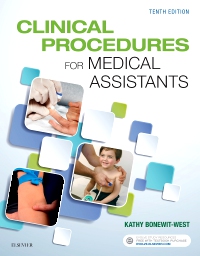
Evolve Resources for Clinical Procedures for Medical Assistants, 10th Edition
Resources

$0.00
Student Resources on Evolve
- Study guide
- Procedural videos
- Review questions
Newer Edition Available
-
1: The Medical Record 1-2 Release of Medical Information 1-3 Preparing the Medical Record
2: Medical Asepsis and the OSHA Standard 2-A: The OSHA Bloodborne Pathogens Standard 2-1: Handwashing2-2: Applying an Alcohol-Based Hand Rub2-3: Application and Removal of Clean Disposable Gloves
3: Sterilization and Disinfection 3-1: Sanitization of Instruments3-3 and 3-4: Wrapping Instruments Using Paper or Muslin and Wrapping Instruments Using a Pouch3-5: Sterilizing Instruments in the Autoclave
4: Vital Signs 4-1: Measuring Oral Body Temperature4-2: Measuring Axillary Body Temperature4-3: Measuring Rectal Body Temperature4-4: Measuring Aural Body Temperature4-5: Measuring Temporal Artery Body Temperature4-6: Measuring Pulse and Respiration4-7: Measuring Apical Pulse4-8: Performing Pulse Oximetry 4-9: Measuring Blood Pressure
5: The Physical Examination 5-1: Measuring Weight and Height5-2 - 5-9: Positioning and Draping5-10: Wheelchair Transfer5-11: Assisting with the Physical Exam
6: Eye and Ear Assessment and Procedures 6-1: Assessing Distance Visual Acuity – Adult6-1: Assessing Distance Visual Acuity – Child6-2: Assessing Color Vision 6-3: Performing an Eye Irrigation6-4: Performing an Eye Instillation6-5: Performing an Ear Irrigation6-6: Performing an Ear Instillation
7: Physical Agents to Promote Tissue Healing 7-1: Applying a Heating Pad7-2: Applying a Hot Soak7-3: Applying a Hot Compress7-4: Applying an Ice Bag7-5: Applying a Cold Compress7-6: Applying a Chemical Pack7-7: Measuring for Axillary Crutches7-8: Instructing the Patient in Crutch Gaits7-9: Instructing the Patient in the Use of a Cane 7-10: Instructing the Patient in the Use of a Walker
8: The Gynecologic Examination and Prenatal Care 8-1: Breast Self-Examination Instructions8-2: Assisting with a Gynecological Examination8-3: Assisting with a Return Prenatal Examination
9: The Pediatric Examination 9-1: Measuring Weight and Length of an Infant9-2: Measuring Head and Chest Circumference of an Infant9-3: Calculating Growth Percentiles9-4: Applying a Pediatric Urine Collector
10: Minor Office Surgery 10-A: Applying Bandages10-1: Applying and removing Sterile Gloves10-2 and 10-3: Opening a Sterile Package, Adding a Peel-Pack Dressing, and Pouring a Sterile Solution10-4: Changing a Sterile Dressing10-5: Removing Sutures and Staples10-6: Applying Adhesive Skin Closures10-7: Minor Office Surgery
11: Administration of Medication and Intravenous Therapy 11-2: Preparing an Injection11-3: Reconstituting a Powdered Drug11-4: Administering a Subcutaneous Injection11-5: Administering an Intramuscular Injection11-6: Z-Track Intramuscular Injection Technique11-7: Administering an Intradermal Injection
12: Cardiopulmonary Procedures 12-1: Running a 12-Lead, Three-Channel Electrocardiogram12-3: Spirometry Testing12-4: Measuring Peak Flow Rate
13: Colon Procedures and Male Reproductive Health13-1 and 13-2: Fecal Occult Blood Testing and Developing the Hemoccult Slide Test
16: Urinalysis 16-1: Clean-Catch Midstream Specimen Collection Instructions16-3: Chemical Testing of Urine with the Multistix 10 SG Reagent Strip16-6: Performing a Urine Pregnancy Test
17: Phlebotomy 17-1: Venipuncture – Vacuum Tube Method17-2: Venipuncture – Butterfly Method17-4 and 17-5: Obtaining a Capillary Blood Specimen
18: Hematology 18-A: Performing a Hemoglobin Determination18-1: Hematocrit 18-2: Preparation of a Blood Smear for a Differential Cell Count
19: Blood Chemistry and Immunology19-1: Blood Glucose Measurement Using the Accu-Chek Advantage Glucose Meter19-B: Performing a Rapid Mononucleosis Test
20: Medical Microbiology 20-A: Rapid Strep Testing20-2: Collecting a Specimen for a Throat Culture



 as described in our
as described in our 